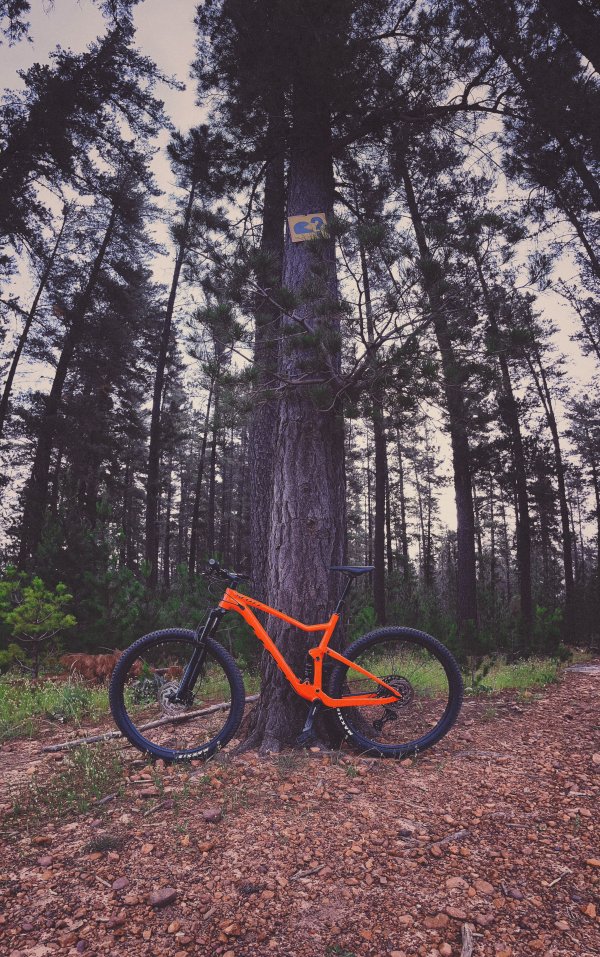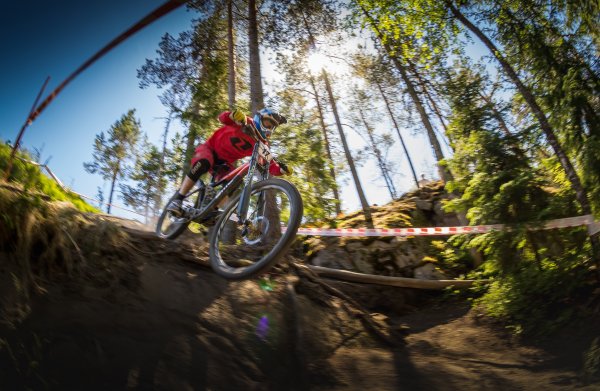If you are interested in an XC bike, or just curious, you may be wondering exactly what capabilities they have…
Can I use an XC bike for downhill?
An XC or cross-country bike is a suitable option for riding downhill. One must be cognizant of the terrain they’re riding down, however, to ensure they have enough control to handle rough or uneven grounds. An XC bike is all about speed, so expect that as you go downhill, you could be traveling at high speeds regardless of if you continue to pedal your bike.
Can I Use A Hardtail For Downhill?

You can ride an XC bike with a hardtail on downhill terrain, but it could pose a challenge. It’s not as easy to control this type of bike when riding downhill as it would be with a different XC model. This is because bumps are going to be felt more at the back of the bike, so having enough control to maneuver downhill safely will require some gradual practice.
What Kind Of Bike Do do You Need For Downhill Mountain Biking?
Overall, a mountain bike is going to be the easiest one to navigate on trails or terrains with various downhill dips. That doesn’t mean another bike won’t do well, such as an XC or trail bike. What’s important apart from the type of bike you choose is not only that you’re confident riding it, but that it’s constructed to handle going downhill.
You want a bike that has a solid suspension and is going to be able to handle the forward momentum produced by going down a hill. You also want a bike that has a solid brake system should you need to make an immediate stop after you’ve finished traversing downhill.
Can XC Bikes Go On Trails?
An XC bike can be a great option for riding on different kinds of trails, and it can be a fun experience when you’re used to the way an XC bike rides. Since the tires on an XC bike are so smooth, you’re going to feel more of an impact when you make it to rough terrain, big gravel trails, or bumps.
What Is An XC Bike Good For?
An XC or cross-country bike is designed for bike riders who want to be able to ride their bike fast and enjoy a bike built for endurance. This type of bike is also fairly easy to ride and control once you get used to it as it’s a lightweight bike. If you’re interested in racing or biking long distances, an XC bike is also an ideal choice.
What Is The Difference Between A Downhill Bike And An XC Bike?
There are a lot of differences between a downhill bike and an XC bike in terms of how each is built physically, as well as what kind of ride they provide. The overall structure of each bike is visibly different, both when you inspect it closely and when seeing it from afar.
For example, the handlebars on an XC bike sit lower than on a downhill bike because it’s structured at the best angle to increase speed.
Do I Need A Downhill Bike To Race Downhill?
It’s not required that you purchase a bike labeled as a “downhill bike” to race downhill. A cross-country bike, an endurance bike, a trail bike, or a downhill bike can also work so long as you find a bike that you’re comfortable riding and is in quality condition.
You may also want to consider choosing a type of bike based on what kind of downhill biking you’re planning on engaging in. If you’re looking to get competitive, you’ll want to consider either a top-notch XC or an endurance downhill bike.
What Do You Need To Go Downhill Mountain Biking?
Downhill mountain biking requires much more than a bike; some pieces of equipment will not only keep you safe but will help enhance your performance. One of the most important items you should have is a full-face helmet. You’ll not only keep your head protected, but you’ll keep your eyes protected as you’re whizzing down hills.
It’s also important that you have eye goggles in addition to your helmet. This can ensure your visibility is never obstructed as you’re riding and also helps keep debris out of your eyes. Gloves are also a very good idea to make sure you can maintain your grip on your handlebars and hand brakes.
Pads on your elbows and knees are also highly recommended to prevent injury.
Finally, what you wear when you’re going downhill mountain biking can impact the quality of your ride. You don’t have to buy branded or expensive sets, but you want clothing that offers you to move without restriction and doesn’t have any hanging threads or ties that could get caught in your bike.
How Do I Get Over My Fear Of Cycling Downhill?

It’s very important to practice with escalating trails or tracks to build up your confidence on your bike before you go full-force toward downhill cycling. When you’re on an even terrain, try to pedal yourself up to a good momentum and let yourself free-ride without hitting the brakes. This will help you get used to going forward quickly, which you’ll be doing when you ride downhill.
How Do You Brake Downhill?
Being able to brake efficiently when riding downhill is easier said than done, but there are some key concepts to keep in mind. For starters, it’ll be difficult to brake when going downhill when your brakes aren’t being maintained to stay in proper working order. You also want to keep your posture fairly straight, as it’ll ensure that when you brake quickly, you’re not pushed forward.
You can also try to slow yourself down gradually by gently pumping your brakes rather than trying to slam on them, though how you brake will depend on why you’re trying to brake. Slowing yourself down at a gradual pace can help you avoid braking incorrectly, which could cause you to fall off your bike as you’re making your way down the hill.